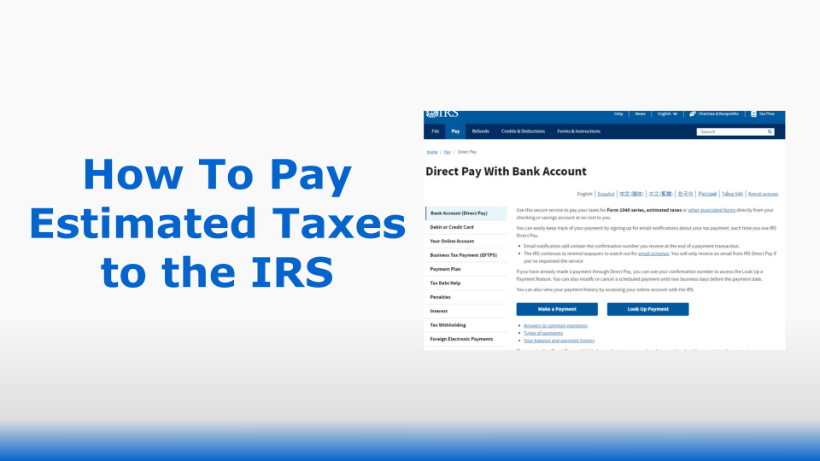How To Pay Taxes
Published:There Are Several Ways You Can Pay Down Your Taxes
In order to determine how much income tax you owe, you will first need to prepare your tax return. You have until April 15th to file and pay your individual income tax. If you miss the deadline, you will be charged penalties and interest.
>> Owe the IRS? Get a Free Tax Relief Consultation
The IRS gives you several options for paying your taxes.
To pay your tax liability in full right away, use one of these three methods:
1. Pay By Check or Money Order
If you are filing a paper tax return, you can make a payment by check or money order. Use IRS Form 1040-V (Payment Voucher) to submit your payment. Form 1040-V can be mailed to the IRS in the same envelope as your tax return — just don’t staple the forms together. Make sure you use the correct IRS mailing address for your tax payment.
2. Pay With a Bank Account (Direct Pay)
Perhaps the easiest way to pay your Federal taxes is by using “Direct Pay” on the IRS.gov website. This method allows you to pay your tax bill directly from your checking or savings account. You will need to provide your Social Security Number (SSN) or Individual Taxpayer Identification Number (ITIN) to use the Direct Pay system. When making a tax payment, you will be asked the reason for your payment — make sure to select “Tax Return” so your payment is applied to the amount owed on your income tax return.
3. Pay With Cash
If you want to pay your taxes in cash, the IRS provides a way for you to do this at participating retail stores. The program is called “PayNearMe” and there’s a $3.99 fee per cash payment. Note that it usually takes 5-7 business days to process cash payments, so make sure you know the applicable tax deadline and plan ahead to ensure that your payment is received on time.
In some cases, you might not have enough money in your bank account to fully pay your tax bill by the due date. The IRS gives you several options here – although you should always pay as much as you can by the deadline in order to minimize penalties and interest:
Pay By Debit or Credit Card
If you don’t have enough funds in the bank, but you do have available credit on a credit card, you may use your credit card to pay your taxes. Visit the IRS website for a list of Payment Processors. Keep in mind that there is a processing fee for using your credit card (the fees are listed and vary by service provider). Most of the time, the interest/fees associated with paying your taxes by credit card are less than the interest and penalties imposed by the IRS for paying late, making this a viable option for many people who don’t have the cash on-hand.
Set Up a Payment Plan (Installment Plan)
If you owe $50,000 or less in taxes, you can apply for an Online Payment Agreement on the IRS website. This means you would agree to pay your tax balance in installments over time. Note that interest will still accrue on your unpaid balance, however, you will not be considered in default. To apply, you’ll need to provide the IRS with information about your income and tax liability. In many cases, they will be able to give you a decision immediately online.
RELATED: IRS Payment Plan Interest
Offer to Settle
If it will cause “extraordinary hardship” to pay your tax liability, you can make a settlement offer to the IRS. This is called an Offer in Compromise. Essentially, you offer to pay a portion of your taxes immediately and the IRS agrees to drop the rest. There’s a lot of paperwork to fill out in order for a settlement to be approved, and you’ll need to demonstrate that it’s impossible for you to fully pay the taxes that you owe. If you are able to pay your taxes through an installment plan, you will not be eligible for an Offer in Compromise.
What Happens If You Don’t Pay the IRS?
If you do not pay your taxes by the due date, the IRS will begin the collection process. Interest compounds daily and monthly penalties will be assessed on your unpaid balance.
Neglecting to pay your taxes can result in a Federal tax lien from the IRS. A tax lien is a claim on your property for failing to pay taxes. A tax lien allows the IRS to garnish your wages and other assets. Furthermore, a lien will not be lifted until the taxes and penalties are paid in full.



